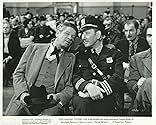Lem Schofield practices law in a formerly small-town that has grown to be an industrialized big city, He bases his ideals on the examples set by Abraham Lincoln and never waivers in them nor... Read allLem Schofield practices law in a formerly small-town that has grown to be an industrialized big city, He bases his ideals on the examples set by Abraham Lincoln and never waivers in them nor his sense of justice for the poor. His deceased partner's son, Clay Clinton, in love with... Read allLem Schofield practices law in a formerly small-town that has grown to be an industrialized big city, He bases his ideals on the examples set by Abraham Lincoln and never waivers in them nor his sense of justice for the poor. His deceased partner's son, Clay Clinton, in love with Schofield's daughter, Judith, joins the firm but is anxious for quick success and conside... Read all
- Frederick the Butler
- (as Tom Louden)
- Director
- Writers
- All cast & crew
- Production, box office & more at IMDbPro
Featured reviews
On the other hand, the filmmakers have a pretty good go at the millionaire who has big parties and is just selfish and politically manipulative. He is humbled and has to bow down, just as the Communist labor organizer has to. So who is left to root for? Just an old-fashioned all-American country lawyer who talks to a statue of Lincoln. This movie even has a character say, "we don't want the left, we don't want the right, we just want to go down the middle." In fact, this is a rather liberal movie of its day, tending to side with the progressive politics of President Roosevelt's New Deal. Ironically, though, it has been treated very harshly by some, but not all, historians (as opposed to movie fans and ciritics). At the time, labor leaders thought it was a right-wing conspiracy movie, because for practical reasons, they were at the time accepting the help and encouragement of Communists who who among the few to offer real assistance at a time when unionism was just beginning to obtain legal legitimacy. Anyone attacking the Communists was thus seen as attacking organized labor. (You have to remember that the so-called Popular Front of the late 30s united all well-meaning people, including both liberals and Communists, in the fight against Fascism, such as in Spain, and this included all good progressive causes in the US such as labor unionism.)
Even now, there are leftist historians who think this movie is a little reactionary or at least anti-labor. In fact, it is just very moderate, or even slightly liberal in retrospect, justified with a kind of sickly-sweet patriotism that tries to substitute love of the flag for any political allegiance. It is almost forgivable in that respect, but its flaws were not invisible to sophisticated audiences at the time. The New York Times movie reviewer in 1939 made slight fun of the fact it was about just everything you could imagine a nice sweet story about modern America should be: "a strike, a strike-breaker, a Communist agitator, a tycoon, an Aunt Tillie, a girl, a boy, a leading citizen and several other things." Nonetheless, it is a fascinating look at how mainstream Hollywood---Paramount studios---tried to find a realistic, entertaining and relatively balanced look at the pressing issues of its day at a time when political divisions were sometimes very bitter.. Much of it is soap opera (including a very young, but good, Susan Hayward), but a great piece of movie and political history, and not a bad little watch.
Did you know
- TriviaA nitrate print of this film survives in the UCLA Film and Television Archives, and is not Listed for preservation.
Details
- Runtime1 hour 29 minutes
- Color
- Aspect ratio
- 1.37 : 1
Contribute to this page































